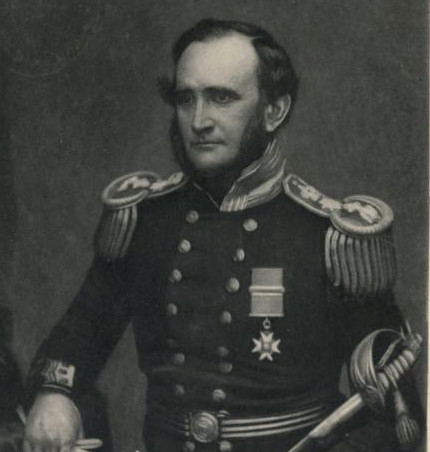On Christmas Day 1866, Bartholomew Sulivan sat down to write a typically long and chatty letter to his old friend, Charles Darwin, commiserating on shared ill-health, glorying in the achievements of their children, offering to collect plant specimens, and reminiscing about their time together on board HMS Beagle:
'The return of Christmass day always recalls strongly that one we passed on an Island of Chiloe . . . when after three weeks wet by night and day and that morning going without breakfast because the rain put the fire out, after the tent was blown down on us . . . finding the party in the Priest's house, which a kind head Indian had opened for them, and where round a roaring fire they were drying our things and cooking a sheep, and we had the luxury of dry clothes & dry blankets for the first time for weeks.' (Letter from B. J. Sulivan, 25 December 1866)
Sulivan, a member of a navy family, was lieutenant on the Beagle during Darwin's time on board. Sociable and loquacious - Darwin described him as a 'real good rattling fellow' - he was at the heart of the lifelong friendships established among the crew, often passing news and gossip, and and was one of the few people whose visits Darwin encouraged. In 1862 he organised a reunion at Down with Arthur Mellersh and John Clements Wickham which Darwin greatly enjoyed even though the excitement made him ill. The Sulivans eventually settled in Bournemouth where they were near neighbours of Darwin's cousins, the Langtons, and they knew the wider family well enough to call on Henrietta when she was there, and to visit William Darwin in Southampton.
From the beginning of their acquaintance, Sulivan took a strong interest in natural history. Following the Beagle voyage, he sent Darwin geological observations from his next posting when he returned to the Falklands with HMS Arrow, and went on to collect fossils during naval surveys of the islands, depositing many with the Royal College of Surgeons. In 1848 he took leave of absence from the navy to settle with his wife in the Falklands where they remained until 1851 - their eldest son, James Young Falkland Sulivan, was the first British subject to be born there. In 1850 he proposed mounting a fossil-hunting expedition to the coast of Patagonia, a proposal Darwin supported, and in 1870 he sent Darwin a prospectus for a natural history society he had helped start in Bournemouth.
The climate in Britain never suited him, and following his return to England in 1851 Sulivan was frequently ill, but never lost his interest in South America. He became an active supporter of the Patagonian Mission Society (known from 1865 as the South American Mission Society), passing on copies of Darwin's 'expression' questionnaire to departing missionaries, and drumming up funds from his former shipmates to support the mission's work. In 1879 he persuaded 'the Beagles' to adopt the orphaned grandson of 'Jemmy Button' (Orundellico), one of the Yahgans repatriated to Tierra del Fuego during the Beagle voyage.
Sulivan's naval career was distinguished. He saw action at the siege of Montevideo in 1845 when British and French naval forces supported the city against the Argentine general Juan Manuel de Rosas. Returning from South America, he joined the Board of Trade in 1856 but was forced to take medical leave in 1864. He was knighted in 1869 and promoted admiral in 1877.
ODNB article: https://doi.org/10.1093/ref:odnb/26769



